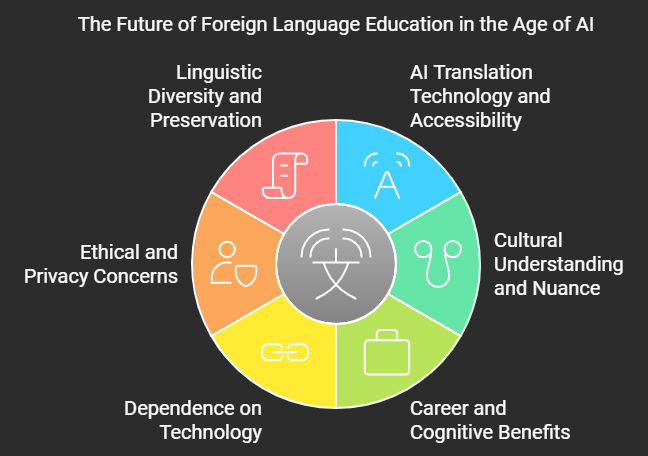(簡単★~難しい★★★★★)語彙難易度★★
目次
Question: Will foreign language education become unnecessary in the age of AI?
AI活用時代、外国語教育は不要になるか?
トレーニング手順
- 分野・トピック毎の観点とキーワードをまとめる
以下の画像のようなイメージ図にしておくと、記憶に定着するのでおススメ - 自分が書きやすい立場・観点で実際に書く
分からない表現はすぐに調べて15分程度で書く - 続いて、先ほどとは反対意見で書いてみる
分からない表現はすぐに調べて15分程度で書く - そのトピックについて実際に誰かと話す、又は1分スピーチをする
- 同じ分野で3つくらいの意見論述を作成する
例えば、宇宙なら宇宙植民・宇宙採掘・宇宙旅行など
外国語学習観点 (Perspectives)
単純化したイラストで整理することで、記憶に定着しやすくなります。

- AI Translation Technology and Accessibility (AI翻訳技術とアクセシビリティ)
The development of AI-driven translation tools may make language learning seem less essential for communication. - Cultural Understanding and Nuance (文化理解とニュアンス)
Language is deeply tied to culture, and AI may struggle to capture cultural subtleties, emphasizing the importance of human language learning. - Career and Cognitive Benefits (キャリアと認知の利点)
Learning foreign languages offers cognitive benefits and career opportunities that AI cannot fully replace. - Dependence on Technology (技術依存)
Relying solely on AI for translation might increase technological dependence and reduce human autonomy in global interactions. - Ethical and Privacy Concerns (倫理的・プライバシーの懸念)
Using AI for language may raise privacy concerns, as translation data is often processed by tech companies, leading to issues of trust and security. - Linguistic Diversity and Preservation (言語の多様性と保存)
The rise of AI translation tools may threaten linguistic diversity, as smaller languages may become less taught or valued.
キーワード (Keywords)
- AI-driven translation (AI主導の翻訳)
- linguistic diversity (言語の多様性)
- cultural nuance (文化的ニュアンス)
- cognitive development (認知発達)
- human interaction (人間の対話)
- language preservation (言語の保存)
- technological dependence (技術的依存)
- privacy concerns (プライバシー懸念)
- communication efficiency (コミュニケーション効率)
- cross-cultural competence (異文化理解能力)
使われそうな動詞 (Verbs)
- translate (翻訳する)
- facilitate (容易にする)
- comprehend (理解する)
- preserve (保存する)
- enhance (向上させる)
- undermine (弱体化させる)
- interact (相互作用する)
- innovate (革新する)
- adapt (適応する)
- diminish (減少させる)
使われそうな形容詞 (Adjectives)
- efficient (効率的な)
- nuanced (ニュアンスに富む)
- cognitive (認知的な)
- autonomous (自律的な)
- indispensable (不可欠な)
- privacy-sensitive (プライバシーに敏感な)
- culturally-rich (文化的に豊かな)
- multilingual (多言語の)
- irreplaceable (置き換え不可能な)
- innovative (革新的な)
使われそうな副詞 (Adverbs)
- efficiently (効率的に)
- culturally (文化的に)
- accurately (正確に)
- autonomously (自律的に)
- cognitively (認知的に)
- seamlessly (シームレスに)
- contextually (文脈的に)
- proactively (積極的に)
- ethically (倫理的に)
- globally (世界的に)
Agree: 外国語学習は不要になるだろう
With the rapid advancement of AI translation technology, some believe that foreign language education will become unnecessary. I support this view, as AI tools offer increased accessibility, reduce dependence on human translation skills, and address privacy concerns effectively.
First, AI-driven translation tools have advanced significantly, providing instant and accurate translations across multiple languages. These tools are accessible to anyone with a smartphone or computer, making it easier to communicate globally without the need for extensive language study. As AI continues to improve, it may eventually eliminate the language barriers that once required years of learning.
Second, using AI for translation can decrease dependence on human language skills. In a world where speed and efficiency are increasingly valued, relying on AI for real-time translation allows people to focus on other skills that are more relevant to their work. Rather than spending years mastering a language, individuals can leverage AI tools to communicate effectively in international settings.
Finally, ethical and privacy concerns surrounding AI translation are becoming more manageable. As technology advances, companies are implementing stricter privacy protocols and data encryption to protect users’ information. Therefore, many of the risks related to translation data being mishandled are being addressed, making AI tools safer to use.
In conclusion, as AI translation technology becomes more advanced and reliable, foreign language education may no longer be necessary. These tools offer practical benefits that can efficiently replace the need for traditional language learning. (237 words)
賛成意見の訳と用語
With the rapid advancement of AI translation technology, some believe that foreign language education will become unnecessary. I support this view, as AI tools offer increased accessibility, reduce dependence on human translation skills, and address privacy concerns effectively.
イントロ: AI翻訳技術の進歩と外国語教育の未来
AI翻訳技術が急速に進化する中で、外国語教育が不要になると考える人もいる。私はこの見解を支持しており、AIツールがアクセスの向上、人間の翻訳スキルへの依存の軽減、そしてプライバシー問題への効果的な対処を提供していると考えている。
- “With the rapid advancement of”: 付帯状況の “with” 。
「AI翻訳技術が急速に進化する中で」といった、背景や状況を示します。
類語: “As a result of the rapid advancement of,” “Due to the rapid development of”(両方とも結果や理由を示す類語ですが、”with”構文は単に状況や背景を提供するニュアンス)
First, AI-driven translation tools have advanced significantly, providing instant and accurate translations across multiple languages. These tools are accessible to anyone with a smartphone or computer, making it easier to communicate globally without the need for extensive language study. As AI continues to improve, it may eventually eliminate the language barriers that once required years of learning.
ボディ1: AI翻訳の即時性とアクセスの向上
まず、AI駆動型の翻訳ツールは大幅に進化しており、複数の言語で即時かつ正確な翻訳を提供している。これらのツールはスマートフォンやコンピュータを持つ誰もが利用でき、広くグローバルなコミュニケーションが可能になった。AIがさらに進化すれば、長年かけて学習しなければならなかった言語の壁を取り払うことができるかもしれない。
- “AI-driven”: 「AIによって駆動される」という意味で、技術に関する形容詞。
類語: “AI-powered,” “AI-enabled” - “providing instant and accurate translations”
文法: “providing” は分詞構文として使われており、「~を提供することで」と付加的な情報を示します。
類語: “delivering quick and precise translations”
Second, using AI for translation can decrease dependence on human language skills. In a world where speed and efficiency are increasingly valued, relying on AI for real-time translation allows people to focus on other skills that are more relevant to their work. Rather than spending years mastering a language, individuals can leverage AI tools to communicate effectively in international settings.
ボディ2: 人的スキルへの依存の減少
次に、AIを使った翻訳は人間の言語スキルへの依存を減らすことができる。スピードと効率がますます重視される現代社会において、AIを使ったリアルタイム翻訳に頼ることで、人々は自分の仕事にもっと関連する他のスキルに集中できる。言語を習得するために何年も費やす代わりに、AIツールを活用して国際的な場で効果的にコミュニケーションを取ることができる。
- “decrease dependence on”
類語: “reduce reliance on,” “lessen dependence on”
反語: “increase dependence on,” “rely heavily on” - “human language skills”
類語: “linguistic abilities,” “verbal communication skills”
反語: “machine-based skills,” “non-verbal skills” - “leverage AI tools”: “leverage” は「活用する」という意味の動詞で、特にビジネスや技術の文脈で使われます。
類語: “utilize,” “take advantage of”
派生語: “leveraging”(現在分詞)、”leveraged”(過去形)
Finally, ethical and privacy concerns surrounding AI translation are becoming more manageable. As technology advances, companies are implementing stricter privacy protocols and data encryption to protect users’ information. Therefore, many of the risks related to translation data being mishandled are being addressed, making AI tools safer to use.
ボディ3: AIの倫理・プライバシー問題への対処
最後に、AI翻訳に関連する倫理やプライバシーの懸念は、より管理しやすくなっている。技術が進歩するにつれて、企業はユーザーの情報を保護するために、より厳格なプライバシープロトコルやデータ暗号化を実施している。そのため、翻訳データが不適切に扱われるリスクは減少しており、AIツールはより安全に使用できるようになっている。
- “ethical and privacy concerns”
類語: “moral and confidentiality concerns,” “ethical issues and privacy matters”
派生語: “ethics”(名詞:倫理)、”private”(形容詞:プライベートな) - “becoming more manageable”
類語: “becoming easier to handle,” “becoming more controllable”
反語: “becoming uncontrollable,” “getting out of hand” - “stricter privacy protocols”
類語: “more rigorous privacy rules,” “tighter data protection protocols” - “data encryption”: “encryption” は「暗号化」を意味し、技術や情報セキュリティの文脈で使われます。
類語: “data protection,” “encoding”
反語: “data exposure,” “decryption”
In conclusion, as AI translation technology becomes more advanced and reliable, foreign language education may no longer be necessary. These tools offer practical benefits that can efficiently replace the need for traditional language learning. (237 words)
結論: 外国語教育が不要になる可能性
結論として、AI翻訳技術がますます進化し信頼性が高まるにつれて、外国語教育はもはや必要なくなるかもしれない。これらのツールは、従来の言語学習の必要性を効率的に置き換える実用的な利点を提供している。
- “more advanced and reliable”
類語: “more sophisticated and dependable”
反語: “outdated and unreliable” - “efficiently replace”
類語: “effectively substitute,” “take the place of efficiently”
反語: “fail to replace,” “inefficiently substitute”
Disagree: 言語学習は不要にならない
In the age of AI, some argue that foreign language education may become unnecessary due to the rise of AI translation tools. However, I believe that learning foreign languages will remain important for several reasons, including cultural understanding, cognitive benefits, and the dangers of over-reliance on technology.
First, AI translation tools struggle to capture the cultural nuances embedded in language. Language is more than just words; it conveys cultural meanings, emotions, and subtleties that AI often fails to understand. Learning a language allows individuals to truly appreciate another culture, communicate more effectively, and avoid misunderstandings that AI translations might create.
Second, learning foreign languages offers cognitive and career advantages. Research shows that bilingual individuals have better problem-solving skills, memory, and cognitive flexibility. In addition, multilingual people often have better career opportunities in today’s globalized job market. Companies still highly value employees who can communicate directly in another language, rather than relying on AI for translation.
Finally, depending too heavily on AI for language translation could increase technological dependence. If people stop learning languages, they may become too reliant on machines, losing their ability to communicate autonomously. This dependency could also lead to problems if AI fails to deliver accurate translations, especially in complex conversations or important negotiations.
In conclusion, while AI translation technology is advancing rapidly, it cannot replace the deep cultural, cognitive, and practical benefits of learning a foreign language. Therefore, foreign language education will remain essential even in the era of AI. (246 words)
反対意見の訳と用語
In the age of AI, some argue that foreign language education may become unnecessary due to the rise of AI translation tools. However, I believe that learning foreign languages will remain important for several reasons, including cultural understanding, cognitive benefits, and the dangers of over-reliance on technology.
イントロ:AI時代における外国語教育の重要性
AI翻訳ツールの台頭により、外国語教育が不要になると主張する人もいるが、私は文化理解、認知的なメリット、そして技術への過度な依存という点から、外国語学習は依然として重要であると考える。
- “the rise of”: ~の台頭、増加
用法: 主に抽象的なもの(テクノロジー、アイデア、問題など)の増加を指す。
例文: “The rise of automation is changing the job market.”
類語: “the growth of,” “the increase in”
反語: “the decline of” - “several reasons, including…”: “including” は前置詞で、具体的な例や項目を挙げる際に使われる。
類語: “such as,” “like”
注意: “including” の後に名詞句が続くが、完全な文は続けられない。 - “over-reliance”: ~に対する過度の依存
派生語: “rely on”(~に頼る), “reliable”(信頼できる), “reliability”(信頼性)
反語: “independence from”(~からの自立)
First, AI translation tools struggle to capture the cultural nuances embedded in language. Language is more than just words; it conveys cultural meanings, emotions, and subtleties that AI often fails to understand. Learning a language allows individuals to truly appreciate another culture, communicate more effectively, and avoid misunderstandings that AI translations might create.
ボディ1:文化理解のための言語学習の重要性
まず、AI翻訳ツールは言語に内在する文化的なニュアンスを捉えるのが苦手である。言語は単なる単語の集まりではなく、文化的な意味や感情、微妙なニュアンスを伝えるものであり、AIはこれらを正確に理解できないことが多い。外国語を学ぶことで、他の文化を深く理解し、効果的にコミュニケーションを取ることができ、AI翻訳では生じる誤解を避けることができる。
- “cultural nuances”: “nuance” は微妙な違い、ニュアンスを指す。
用法: より深い理解を示す文脈で使われ、”cultural” などの形容詞とよく一緒に使われる。例文: “The nuance of her expression conveyed more than words could.”
類語: “subtlety,” “shade”
反語: “obviousness,” “blatancy” - “embedded in language”: 分詞構文で、”embedded” は過去分詞が前置詞 “in” と一緒に使われ、”language” に対する説明を加えている。
派生語: “embed”(動詞、~に埋め込む)
類語: “ingrained in,” “rooted in” - “conveys”: 「伝える」という意味。抽象的なアイデアや感情を伝達する際に使用。
類語: “communicate,” “express,” “impart”
反語: “withhold,” “suppress” - “truly appreciate another culture”: “appreciate” は「理解する」「感謝する」両方の意味があるが、ここでは「深く理解する」ニュアンス。
派生語: “appreciation”(名詞、感謝、理解)
注意: “appreciate” は後に “for” や “of” を伴うことが多いが、ここでは目的語だけ。
Second, learning foreign languages offers cognitive and career advantages. Research shows that bilingual individuals have better problem-solving skills, memory, and cognitive flexibility. In addition, multilingual people often have better career opportunities in today’s globalized job market. Companies still highly value employees who can communicate directly in another language, rather than relying on AI for translation.
ボディ2:外国語学習による認知的およびキャリアのメリット
次に、外国語を学ぶことは認知機能やキャリアに多くの利点をもたらす。研究によれば、バイリンガルの人は問題解決能力や記憶力、認知の柔軟性が高いことが示されている。また、今日のグローバルな職場では、他の言語で直接コミュニケーションが取れる人材が高く評価されており、AI翻訳に頼らないことで、より良いキャリアの機会を得られる。
- “bilingual individuals”: 「二言語を話す人」
派生語: “bilingualism”(名詞、バイリンガル状態)
類語: “multilingual”(多言語を話す人)
反語: “monolingual”(単一言語の話者) - “cognitive flexibility”: “cognitive” は「認知的な」、”flexibility” は「柔軟性」
用法: 主に心理学や教育に関する文脈で使用され、思考や問題解決の柔軟性を示す。
類語: “mental agility,” “adaptive thinking” - “career opportunities“: “opportunity” は「機会」で、特に仕事やキャリアに関連する文脈でよく使われる。
派生語: “opportunistic”(形容詞、機会をとらえる), “opportunist”(名詞、機会主義者)
類語: “job prospects,” “employment chances” - “relying on AI for translation”: 「~に依存する」
類語: “depend on,” “count on”
反語: “independence from,” “self-sufficiency”
Finally, depending too heavily on AI for language translation could increase technological dependence. If people stop learning languages, they may become too reliant on machines, losing their ability to communicate autonomously. This dependency could also lead to problems if AI fails to deliver accurate translations, especially in complex conversations or important negotiations.
ボディ3:技術依存のリスク
最後に、AIに言語翻訳を依存しすぎると、技術への依存度が高まる恐れがある。人々が言語を学ぶのをやめると、自主的にコミュニケーションを取る能力を失いかねない。また、AIが複雑な会話や重要な交渉で正確な翻訳を提供できなかった場合、深刻な問題が生じる可能性がある。
- “autonomously”: 「自主的に」「自律的に」
派生語: “autonomy”(名詞、自律), “autonomous”(形容詞、自律的な)
反語: “dependently,” “submissively” - “fail to “: 「~し損ねる」「~できない」
類語: “unable to,” “neglect to”
反語: “succeed in,” “manage to”
In conclusion, while AI translation technology is advancing rapidly, it cannot replace the deep cultural, cognitive, and practical benefits of learning a foreign language. Therefore, foreign language education will remain essential even in the era of AI. (246 words)
結論:外国語学習の継続的な必要性
結論として、AI翻訳技術は急速に進化しているものの、外国語学習がもたらす文化的、認知的、実践的な利点に代わることはできない。したがって、AI時代においても外国語教育は不可欠である。
- “cannot replace”
派生語: “replaceable”(形容詞、置き換え可能な), “replacement”(名詞、代替品)
類語: “fail to substitute,” “unable to take the place of”
まとめ
学習振り返り: AI時代における言語学習の必要性について
今回のAIと言語学習に関する投稿記事では、AI翻訳技術の進化に伴い、外国語学習が不要になるという賛成意見と、依然として外国語学習は重要だという反対意見が取り上げられました。どちらの意見も、現代社会における技術の進歩と人間の能力とのバランスを考える上で重要な視点を提供しています。
賛成意見の要点
AI翻訳技術が急速に発展している現在、AIツールは瞬時に複数の言語を正確に翻訳できるようになり、国際的なコミュニケーションがよりアクセスしやすくなりました。この技術により、時間をかけて言語を学ぶ必要がなくなり、人々は他のスキルに集中できるようになります。また、プライバシーやデータ保護に対する懸念も、技術の進化により解消されつつあり、安全に利用できる環境が整ってきています。このように、AI翻訳技術の進歩によって外国語学習は不要になる可能性があるという主張が展開されました。
反対意見の要点
一方で、外国語学習は依然として重要だという意見もあります。AI翻訳ツールでは、文化的なニュアンスや感情を正確に伝えることが難しく、誤解が生じるリスクがあります。また、外国語を学ぶことで得られる認知的なメリットやキャリアの機会も見逃せません。バイリンガルやマルチリンガルであることは、問題解決能力や記憶力の向上に寄与し、グローバルな職場での競争力を高めます。さらに、AIに過度に依存することで、人々が自律的にコミュニケーションを取る能力が低下する懸念もあります。
学習ポイント
今回の記事を通して、いくつかの重要な学習ポイントを振り返ります。
- 文法構造の理解:
- “with” 構文の使用方法と、分詞構文との違いについて学びました。付帯状況の “with” は状況や背景を提供するのに対し、分詞構文は主語の動作や状態に焦点を当てます。このような違いを理解することで、英作文での表現力が向上します。
- 語彙の拡充:
- “reliance” や “nuance” など、AIや翻訳に関連する高度な語彙を学びました。それぞれの語の類語や反語を知ることで、同じ内容をさまざまな表現で伝えるスキルが身につきます。
- 論理的思考の強化:
- 賛成意見と反対意見の両方を比較することで、AIの利点とリスクをより明確に理解できました。このプロセスは、英検1級のライティングやスピーキング試験で求められる論理的思考を養うのに役立ちます。
今後の学習に向けて
今回の振り返りを踏まえ、AI技術や他の技術の進歩に伴う社会的影響について、より深く考察することが重要です。また、これからも文法や語彙の知識を高め、意見を論理的かつ説得力のある形で表現できるよう、練習を重ねていきましょう。
英検1級英作文(意見論述・要約問題)・二次試験(面接)リストはコチラ
英検1級トピック探しにおススメのサイト:Britanica ProCon.org
英作文(意見論述・要約問題)対策テキスト

「どんなテキストがおすすめですか?」とよく聞かれるのですが、「問題量が多い」ものと「知識量を増やせるもの」の2種類を準備すると良いかと思います。
また、あまりにも文法解説が長いテキストは、英検1級対策としては、「?」という感じがします。
「何を、どんな観点で、どう伝えるか」にフォーカスして書かれたテキストを選んでください。
英作文テキストは、「最低でも3ラウンドする」。語彙や表現を増やす系のテキストは「最低でも5ラウンドする」つもりで、1ページごとに時間をかけすぎず、分からない時はすぐにググりながらテンポよく進めていきます。




